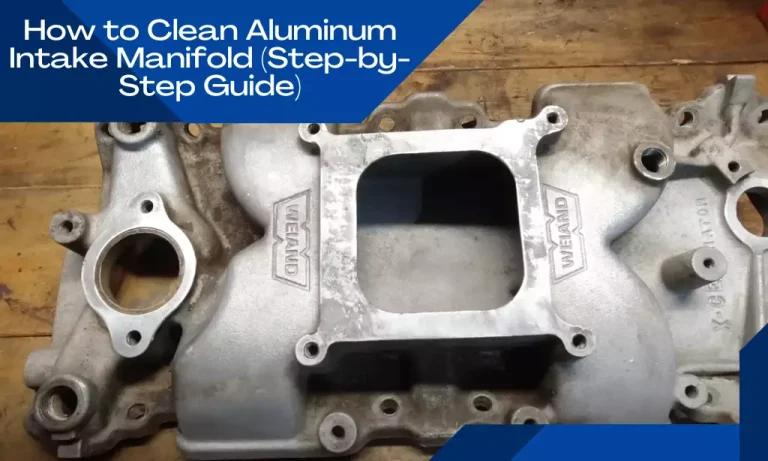Car Sounds Like Lawn Mower: The Shocking Truth Revealed
If your car sounds like a lawn mower, it may indicate a problem with the exhaust system or a faulty muffler. When the muffler isn’t functioning properly, it can create a loud and rough noise similar to a lawn mower.
This can be caused by rust, holes, or damage to the muffler itself. It’s important to have this issue diagnosed and repaired by a mechanic as soon as possible to prevent further damage to your vehicle’s exhaust system. Is your car making a noise that resembles a lawn mower?
If so, don’t ignore it, as it could indicate a problem with your exhaust system or muffler. The muffler, which is responsible for reducing the noise produced by the engine, can become faulty and create unusual sounds when it malfunctions. This can be caused by rust, holes, or damage to the muffler itself. While it may be tempting to brush off the noise as a minor inconvenience, it’s crucial to address the issue promptly to avoid potential damage to your car’s exhaust system. We will explore the possible causes of a car sounding like a lawn mower and discuss the importance of getting it inspected and repaired by a professional mechanic.
Why Is My Car Sounding Like A Lawn Mower?
Have you ever sat behind the wheel of your car and thought, “hey, why does my car sound like a lawn mower? ” It can be quite concerning and even a little embarrassing when your car emits unusual sounds that resemble a lawn mower in action.
But fear not, for there may be a valid reason behind this peculiar symphony. Let’s explore some possible explanations for why your car is sounding like a lawn mower.
Possible Reasons For Unusual Car Sounds
When it comes to the peculiar noise your car is making, it could be due to a variety of factors. Let’s break them down:
Engine-Related Issues
- Clogged air filter: A dirty or clogged air filter can restrict airflow to the engine, causing it to work harder and emit a sound similar to that of a lawn mower.
- Misfiring spark plugs: Faulty spark plugs can disrupt the engine’s combustion system, leading to a rough-running engine and a noisy rumble.
- Worn-out timing belt: A worn-out timing belt can cause the engine’s timing to be off, leading to a rattling noise reminiscent of a struggling lawn mower.
- Low engine oil: Insufficient engine oil can prevent proper lubrication of the engine components, resulting in a harsh, grinding noise.
- Loose or damaged belts: Loose or damaged belts, such as the serpentine belt or timing belt, can create a whining or squealing sound that resembles a lawn mower in need of maintenance.
Exhaust System Problems
- Exhaust leak: A leak in the exhaust system can cause a distinct hissing or roaring noise, similar to that of a lawn mower’s muffler.
- Catalytic converter issues: When the catalytic converter is damaged or clogged, it can produce a rattling or rumbling sound, reminiscent of a struggling lawn mower engine.
These potential causes of your car’s lawn mower-like sounds are not exhaustive, but they should provide some insight into the issue. Remember, if you’re unsure or uncomfortable diagnosing the problem yourself, it is always wise to seek professional assistance to ensure the safety and longevity of your vehicle.
So, the next time your car emits that distinctive lawn mower sound, don’t fret. Take a deep breath and consider these possible culprits before jumping to conclusions. It might just be a minor issue that can be easily resolved with a little maintenance or repair.
Now that you’re armed with knowledge about potential causes of unusual car sounds resembling a lawn mower, you can approach the situation with confidence and clarity. Happy driving, and may your car’s engine roar like a well-tuned symphony!
Understanding Engine-Related Noises
Categorizing Engine Sounds
When your car starts sounding like a lawn mower, it can be quite concerning. However, not all engine-related noises are cause for alarm. Understanding the different types of sounds can help you determine whether it’s a minor issue or a serious problem that needs immediate attention.
Let’s categorize engine sounds to help you identify what’s going on under the hood:
- Rattling or knocking sounds: These types of noises usually indicate a problem with the engine’s combustion process. It could be due to worn-out spark plugs, incorrect fuel-air mixture, or even carbon deposits in the combustion chamber.
- Whining or squealing sounds: If you hear high-pitched whining or squealing noises, it could be a sign of a loose or worn-out belt. The belt in question may be the serpentine belt, which drives multiple accessories in your car like the alternator, power steering pump, and air conditioning compressor.
- Clicking or ticking sounds: These sounds often occur when the engine is running, and they may be related to the valves or lifters. Worn-out or improperly adjusted valves can lead to clicking or ticking noises, necessitating a thorough inspection.
Common Engine Problems That Mimic A Lawn Mower Sound
Now that we’ve categorized the sounds, let’s look at common engine problems that can make your car sound like a lawn mower:
- Exhaust leak: A leak in the exhaust system can result in a loud, rumbling noise that may resemble a lawn mower. This issue often occurs due to a cracked or damaged exhaust manifold, gasket, or pipe.
- Muffler issues: An excessively loud or droning sound from your car’s exhaust may be attributed to a damaged or malfunctioning muffler. Over time, mufflers can corrode or develop holes, leading to a decrease in their effectiveness.
- Engine misfire: A misfiring engine can produce a sound akin to a lawn mower. This problem occurs when the air-fuel mixture ignites improperly or fails to ignite at all. It can be caused by various factors such as faulty spark plugs, a malfunctioning ignition coil, or a clogged fuel injector.
Importance Of Regular Engine Maintenance
To prevent your car from resembling a lawn mower, it’s crucial to prioritize regular engine maintenance. Here’s why it matters:
- Early problem detection: Routine maintenance allows mechanics to identify and address potential engine issues before they escalate, saving you from costly repairs in the future.
- Improved performance and fuel efficiency: Regular maintenance, including oil changes, air filter replacements, and spark plug inspections, optimizes your engine’s performance and ensures efficient fuel consumption.
- Prolonged engine lifespan: By taking care of your engine through consistent maintenance, you can extend its longevity and avoid premature replacement.
Remember, diagnosing engine problems requires a professional eye. If your car sounds like a lawn mower, it’s best to consult a certified mechanic who can accurately pinpoint the issue and provide an appropriate solution.
Identifying Exhaust System Troubles
Car Sounds Like Lawn Mower
Are you experiencing an unusual sound coming from your car that resembles a lawn mower? If so, it could be a clear indicator of an issue with your exhaust system. The exhaust system plays a crucial role in sound production, and any troubles with it can result in unwanted noises.
In this section, we will explore the common exhaust system problems that can cause your car to sound like a lawn mower and the steps to diagnose and fix these issues effectively.
Role Of The Exhaust System In Sound Production
The exhaust system in your car serves a dual purpose – it helps eliminate harmful gases and muffle the noise generated by the engine. It consists of several components, including the exhaust manifold, catalytic converter, muffler, and tailpipe. Each of these parts plays a role in reducing engine noise and directing exhaust gases away from the vehicle.
Common Exhaust System Issues Causing Lawn Mower-Like Sounds
Several factors can contribute to your car producing a sound similar to a lawn mower. Identifying these common exhaust system issues will help you address the problem promptly. Here are the main culprits:
- Exhaust leaks: Holes or cracks in any part of the exhaust system can cause unwanted noise.
- Rust or corrosion: Over time, the exhaust system can rust or corrode, leading to weakened components that may produce strange sounds.
- Damaged muffler or catalytic converter: A damaged muffler or catalytic converter can disrupt the flow of exhaust gases, causing noisy vibrations.
- Loose or broken hangers: Hangers are essential for supporting the exhaust system. If they become loose or break, it can result in parts rattling and causing a lawn mower-like sound.
Steps To Diagnose And Fix Exhaust System Problems
When faced with a car that sounds like a lawn mower, it’s crucial to diagnose and resolve the issue promptly. Follow these steps to effectively identify and fix exhaust system problems:
- Visual inspection: Inspect the exhaust system for any visible signs of damage, such as holes, cracks, or rust. Pay close attention to the muffler, catalytic converter, and tailpipe.
- Listen for the source: Start the engine and carefully listen for the noise. Try to locate where the sound is coming from to narrow down the potential issue.
- Check the gaskets: Inspect the gaskets connecting various exhaust system components. Damaged gaskets can result in leaks and cause unusual noises.
- Tighten or replace loose or damaged parts: If you find any loose or damaged parts, tighten or replace them as necessary. This may involve tightening or replacing hangers, clamps, or brackets.
- Repair or replace damaged components: If you discover a damaged muffler, catalytic converter, or any other critical component, consider having it repaired or replaced by a professional mechanic.
Remember, dealing with exhaust system troubles can be complex. If you are unsure about any step or unable to diagnose the issue yourself, it’s recommended to seek professional assistance. A qualified mechanic will have the expertise and tools required to tackle exhaust system problems effectively, ensuring your car sounds more like a well-tuned engine than a lawn mower.
So, now that you are equipped with a better understanding of the exhaust system’s role in sound production and the common issues that can cause your car to sound like a lawn mower, you can confidently tackle the problem head-on.
By following the necessary steps to diagnose and fix any exhaust system problems, you’ll soon have your car purring like a contented cat once again.
Diy Solutions For Car Sounds Like Lawn Mower
Car Sounds Like Lawn Mower
If you’ve ever noticed that your car sounds more like a lawn mower than a proper vehicle, you’re not alone. Engine issues and problems with the exhaust system can often result in this unusual noise. While it’s important to get your car checked by a professional mechanic, there are a few diy solutions you can try before taking it to the shop.
In this section, we’ll explore some precautions and safety measures to keep in mind before attempting any fixes. We’ll also provide a step-by-step guide to resolving engine-related problems, as well as some tips for troubleshooting and repairing exhaust system issues.
Precautions And Safety Measures Before Attempting Diy Fixes
Before you dive into any diy car repairs, it’s essential to take some necessary precautions to ensure your safety and the well-being of your vehicle. Here are a few key points to keep in mind:
- Always park your car on a flat, stable surface away from traffic before attempting any repairs.
- Make sure the engine is completely cool before you start working on it to avoid any burns or injuries.
- Use safety equipment, such as gloves and protective goggles, to protect yourself from any potential hazards.
- Familiarize yourself with your car’s manual and understand the specific instructions related to the repairs you’re attempting.
- If you’re unsure or uncomfortable with any repair, it’s best to leave it to a professional mechanic to avoid any further damage to your vehicle.
Step-By-Step Guide To Resolving Engine-Related Problems
If your car sounds like a lawn mower, the issue might be related to the engine. Here’s a step-by-step guide to help you diagnose and resolve common engine-related problems:
- Check the oil level: Low or dirty oil can cause engine noise. Ensure that your car has sufficient oil and consider changing it if needed.
- Inspect the spark plugs: Worn-out or faulty spark plugs can result in rough engine sounds. Remove and inspect the spark plugs for any signs of damage or wear, and replace them if necessary.
- Examine the drive belts: Loose or worn-out drive belts can produce unusual sounds. Inspect them for signs of cracking or fraying, and tighten or replace them as required.
- Verify the air filter: A clogged air filter can affect engine performance and cause noise. Remove the air filter and clean or replace it if it’s dirty or damaged.
- Check the fuel system: Issues with the fuel system, such as a clogged fuel injector or fuel filter, can lead to engine noise. Consider cleaning or replacing these components if necessary.
Tips For Troubleshooting And Repairing Exhaust System Issues
A faulty exhaust system can also contribute to a car’s lawn mower-like sound. Here are a few tips to help you troubleshoot and repair common exhaust system problems:
- Visually inspect the exhaust pipes and muffler for any signs of damage, such as rust, holes, or leaks.
- Tighten any loose clamps or brackets that connect the different components of the exhaust system.
- Replace worn-out or damaged exhaust gaskets to ensure a proper seal.
- Use a mechanic’s stethoscope or a length of hose to pinpoint the source of the noise and identify any specific components that may need attention.
- If needed, consult a professional mechanic or exhaust system specialist for further diagnosis and repair.
Remember, while these diy solutions can help address certain issues causing your car to sound like a lawn mower, it’s always recommended to seek professional advice if you’re unsure or if the problem persists. Prioritizing your safety and the proper functioning of your vehicle should always be the top priority.
When To Seek Professional Help
Car Sounds Like Lawn Mower
If you’ve noticed that your car’s engine is making a noise similar to a lawn mower, it’s important to address the issue promptly. While the exact cause of this noise can vary, it often indicates a problem that needs professional attention.
In this section, we’ll discuss the signs that indicate the need for professional inspection, the benefits of consulting a mechanic or car specialist, and the cost considerations for professional repairs.
Signs That Indicate The Need For Professional Inspection
- Rattling sound: A car engine that sounds like a lawn mower may produce a consistent rattling noise, particularly when idling or accelerating. This could be an indication of loose components or a failing part that requires expert evaluation.
- Loss of power: If you experience a sudden loss of power when driving, along with the lawn mower-like engine sound, it could indicate a problem with the fuel system, exhaust system, or engine components. Seeking professional help is crucial to diagnose and resolve the issue effectively.
- Unusual vibrations: Vibrations, especially when accompanied by the distinct lawn mower-like noise, can point to engine problems such as misfiring cylinders or a worn-out pulley. Ignoring these vibrations may lead to further damage and costly repairs.
- Reduced fuel efficiency: If you notice a significant decrease in your car’s fuel efficiency, and it coincides with the lawn mower-like engine noise, it could signal issues with the fuel system or engine components. Consulting a professional can help identify the root cause and restore your car’s fuel efficiency.
Benefits Of Consulting A Mechanic Or Car Specialist
- Expert diagnosis: A qualified mechanic or car specialist has the knowledge and experience to accurately diagnose the underlying issue causing the lawn mower-like noise. They have access to specialized tools and equipment to perform comprehensive inspections, saving you time and frustration.
- Prevent further damage: Ignoring the lawn mower-like sound in your car’s engine may lead to more severe damage over time. By seeking professional help, you can prevent further deterioration and costly repairs down the line.
- Assurance of quality repairs: A professional mechanic or car specialist can provide reliable repair solutions tailored to your car’s specific needs. They can source high-quality parts and perform repairs with precision, ensuring the issue is resolved effectively.
- Peace of mind: Knowing that a professional is working on your car can provide peace of mind. You can trust their expertise to address the problem correctly, allowing you to drive with confidence and reliability.
Cost Considerations For Professional Repairs
- Diagnostic fees: When seeking professional help for a lawn mower-like car engine noise, you may have to pay a diagnostic fee to cover the time and expertise required for inspection. However, this fee is essential to pinpoint the exact issue and provide accurate cost estimates for any necessary repairs.
- Repair costs: The overall cost of repairs will depend on the specific problem causing the lawn mower-like sound in your car’s engine. It could range from a minor issue that requires a simple fix to a more complex problem that involves replacing major components. Consulting with a professional will help you understand the repair options and associated costs.
- Long-term savings: While professional repairs may come at a cost, addressing the issue promptly can prevent further damage and potential breakdowns, ultimately saving you money in the long run. Effective repairs can also improve your car’s fuel efficiency, saving on ongoing fuel expenses.
Addressing a lawn mower-like noise in your car’s engine is crucial for its performance, reliability, and your safety on the road. By recognizing the signs that demand professional inspection, understanding the benefits of consulting a mechanic or car specialist, and considering the costs involved, you can make an informed decision to resolve the issue and restore your car’s smooth operation.
Remember, prioritizing professional assistance is key to maintaining your car’s health and longevity.
Preventive Measures For Maintaining A Quiet Ride
Car Sounds Like Lawn Mower
If your car sounds more like a lawn mower than a smooth-running machine, it’s time to take action. No one wants to endure a noisy ride, so it’s essential to address the issue promptly. In this section, we will discuss preventive measures you can take to maintain a quiet ride.
By following a regular maintenance checklist, prioritizing timely engine oil changes, and preserving the longevity of your exhaust system, you can keep your car running smoothly and quietly.
Regular Maintenance Checklist To Avoid Future Sound Issues:
Maintaining your vehicle through regular upkeep is crucial for minimizing potential sound issues. By following these essential maintenance tasks, you can prevent your car from sounding like a lawn mower:
- Regularly check and tighten all loose bolts and screws in your vehicle’s engine and body.
- Monitor the condition of your tires, ensuring they are properly inflated and aligned.
- Regularly inspect and replace worn-out brake pads and rotors.
- Keep the suspension system in good condition by checking and replacing any damaged or worn-out parts.
- Ensure that the timing belts and serpentine belts are maintained as per the manufacturer’s recommendations.
- Regularly replace the air filter to keep the engine running smoothly and reduce any excessive noise.
Importance Of Timely Engine Oil Changes:
Engine oil plays a crucial role in lubricating the engine components, reducing friction, and preventing excessive noise. Here’s why timely oil changes are vital in maintaining a quiet ride:
- Engine oil tends to break down over time, losing its lubricating properties. Regular oil changes ensure that the engine remains well-lubricated, reducing the chances of unwanted noises.
- Old and dirty oil can cause a buildup of sludge and debris in the engine, leading to increased friction and noise. Timely oil changes help keep the engine clean and free from harmful deposits.
- Adequate oil levels and quality ensure optimal engine performance, minimizing the risk of strain or stress that can result in unusual noises.
Tips For Preserving The Exhaust System’S Longevity:
The exhaust system plays a significant role in reducing noise and ensuring proper engine performance. Here are some tips to help preserve its longevity and keep your car sounding quiet:
- Regularly inspect the exhaust system for leaks or damage. Any cracks or holes can contribute to increased noise levels and should be repaired promptly.
- Avoid driving through high water levels, as this can lead to water entering the exhaust system, causing rust and damage. Be cautious when driving through flooded areas.
- Refrain from revving the engine excessively or engaging in aggressive driving behaviors. This can result in increased stress on the exhaust system, leading to potential noise issues.
- Be mindful of the types of fuel additives or octane boosters you use. Some additives can damage the exhaust system if used incorrectly.
- Schedule regular maintenance appointments with qualified technicians who can assess and address any potential exhaust system issues.
By adhering to a regular maintenance checklist, prioritizing timely engine oil changes, and preserving the exhaust system’s longevity, you can ensure a quiet and smooth ride. Your car will no longer sound like a lawn mower, and you’ll be able to enjoy a peaceful driving experience.
Conclusion
If your car sounds like a lawnmower, it could be indicative of several underlying issues. From a loose or damaged exhaust system to a faulty catalytic converter or engine problem, identifying the root cause is crucial for ensuring the safety and performance of your vehicle.
Regular maintenance and inspections by a qualified mechanic can help catch and address these issues early on, preventing further damage and costly repairs. Remember, ignoring strange noises coming from your car may lead to more serious problems down the road.
So, don’t hesitate to take action and seek professional help if your car sounds like a lawnmower. By addressing these issues promptly, you can ensure a smooth and enjoyable driving experience while keeping your vehicle in optimal condition.
- Why Are My Car Headlights Not Bright Enough? - May 9, 2024
- How Long Can You Drive With An EVAP Leak? - May 9, 2024
- What Does B Stand for in a Car? [Full Guide] - May 9, 2024


![Do Mazdas Hold Their Value? [Explained 2024]](https://automhelp.com/wp-content/uploads/2023/07/Top-5-Mazda-Cars-2023-2024-·-Car-Review_000013724-768x432.webp)

